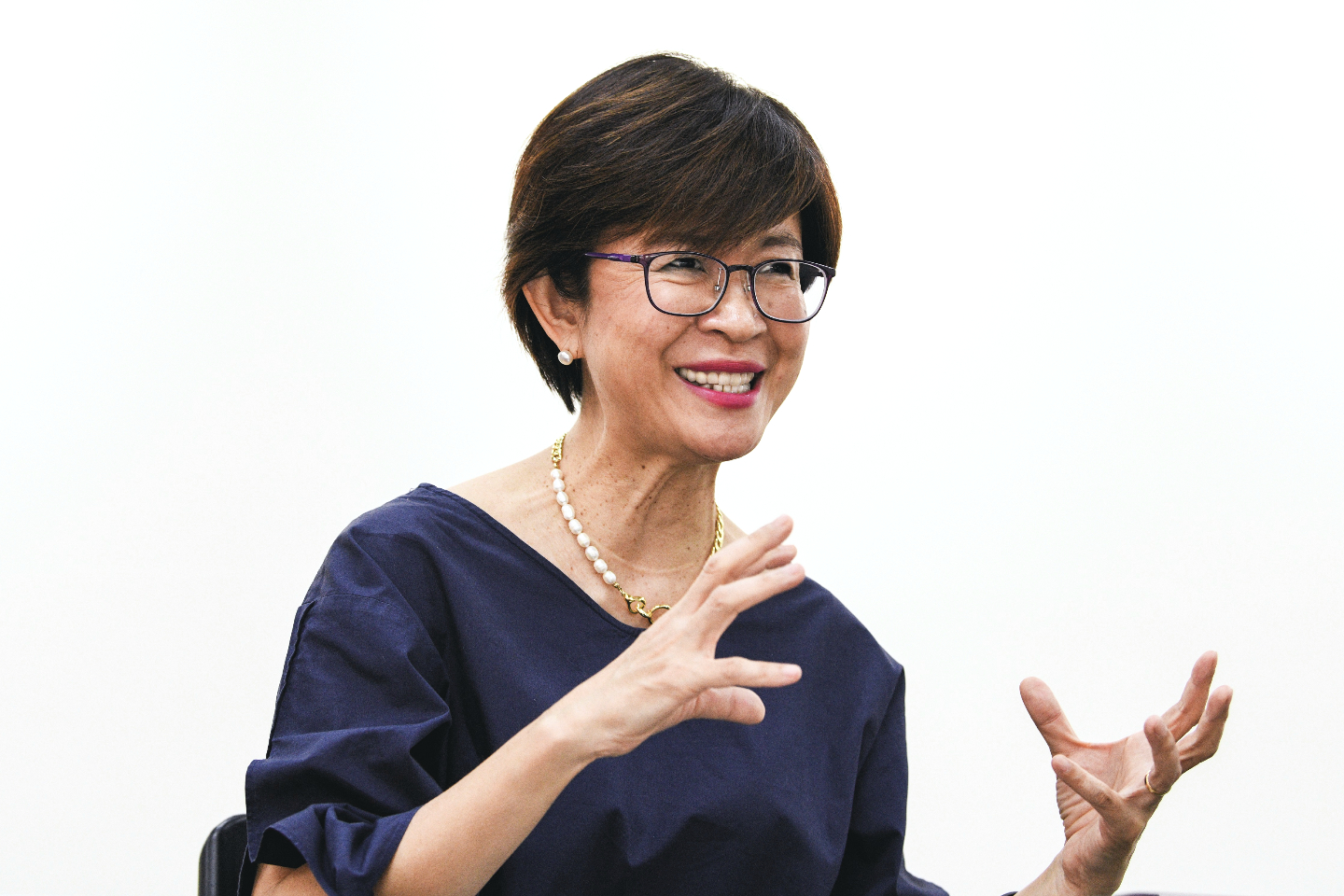
A lawyer by profession, Leong joined World Vision 10 years ago (Photo: Shahrill Basri/ The Edge Malaysia)
Terry Leong has been World Vision Malaysia’s CEO for just a few months, but she is already getting ready to vacate the position — that is how far ahead she plans. “We had a CEO who had been with us for five years. I am in this position now but I am standing here and holding the fort until they find someone else … Because we will soon need someone younger,” she begins. “With the way things are going digitally, my advice to the board has been to hire someone who can understand the lingo and really take the company forward. It’s been a great 25 years in Malaysia and I really want to see World Vision succeed for another 25, so my role is to run the organisation now knowing that someone younger should, and must, take over eventually.”
Nearing 60, Leong is hardly what one would call old but we see her point in pushing for a younger person to take over the stewardship of the almost 70-year-old organisation. Founded by Rev Dr Robert Pierce to support the needs of Korea’s war orphans in 1953, World Vision’s child sponsorship programme now reaches thousands of children and their communities.
A lawyer by profession, Leong joined World Vision 10 years ago. An empty nester as her children had headed off overseas to study, Leong was mulling over what her next steps should be — continue her corporate work, or try her hand at something else?
Fate intervened in two ways. First, she and her husband came across Best Things in the Worst Times by Graeme S Irvine, and was deeply inspired by the insiders’ story it told of World Vision and its work to support children. Soon after, a friend contacted her with the possibility of heading World Vision’s IT shared services centre that was scheduled to be opened in Kuala Lumpur soon.
The choice was easy enough for her to make, and what was meant to be a four-year assignment heading up just one division resulted in a decade-long journey that saw her rise through the ranks, including representing World Vision at the United Nations’ Secretary-General’s office for corporate innovation, right up to the CEO’s position. “It soon became an organisation I loved. It’s like that line from Hotel California — you can never leave,” she laughs.
A picture of the present
World Vision International has not needed to change very much in the last seven decades as its goal has remained the same — helping children who require assistance. “Child sponsorship is still a very important part of World Vision. It is our main product because it gives stability to the community the child lives in — what many people don’t know is that a part of the RM65 donated for each child goes to the community, funding things like water and sanitation, education, child protection matters and so on. It uplifts entire communities, not just one child,” says Leong.
chosen_5.jpg
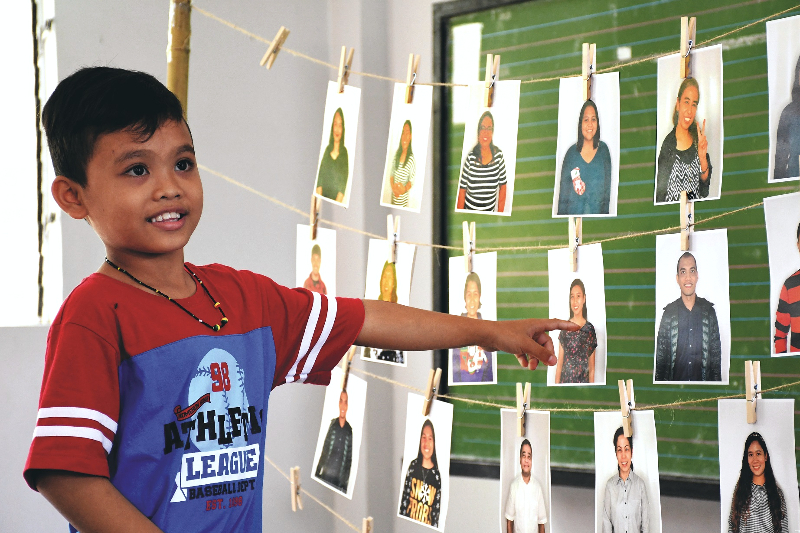
One thing that has changed recently, though? Children now pick their “adoptive parents”, instead of the other way around, and the programme, called Chosen, launches for the second time in Malaysia on June 20. “Between my husband and me, we have five children that we support and we chose them, so to speak. Under Chosen, the children are given pictures of potential donor families and they get to choose. It’s about empowering the child and giving them the choice, rather than treating them as mere recipients. I do believe it also affects the donor — we tend to have expectations as donors, but the Chosen programme really shifts the power in this equation.”
The mechanics are quite simple, and put the decision-making in the hands of the children. First, the names and pictures of registered donors are sent to a local community where the staff then prepare a time for the children to choose their sponsors. Once you have been selected, you will receive a photo of your new sponsored child holding your photo, plus a letter about why you were chosen. This ensures that no child is left behind or not chosen for any reason, which might have happenned in the past.
Unfortunately, the challenging situations that necessitate World Vision’s work have not stopped — asked whether things have become easier at all, Leong’s answer is a weary “no”. In fact, the organisation predicts that by 2030, 80% of the world’s poorest people will be living in places that are very dangerous for children. Some experts call such places “fragile contexts” — where chronic instability, conflict and violence leave large numbers of children caught in a trap of extreme vulnerability, coupled with crippling poverty. Those with a responsibility to protect children and their families may be unable or unwilling to do so. Children in fragile contexts live on knife’s edge and are extremely vulnerable to violence, exploitation, abuse and neglect.
“Because of war and conflict, there are so many displaced families — even before Ukraine, consider Syria! We haven’t become better; I sometimes think we might have become worse,” Leong says, looking visibly troubled. “I saw a documentary recently about Vietnamese boat people landing in the US and the stories they told reminded me of what I had heard from refugees I taught in Australia. The world has progressed in many ways, but some things really haven’t changed at all. World Vision is tackling this by setting up care centres in camps, helping with child protection issues, and even providing activities for mothers to empower them to keep the kids going. ‘No’ is the sad answer to your question, but that’s the way it is lah.” This issue has become so critical that World Vision has established a separate portal, childhoodrescue.wvi.org, for interested parties to learn more about these realities, ask questions and participate in solutions.
world_vision.jpg
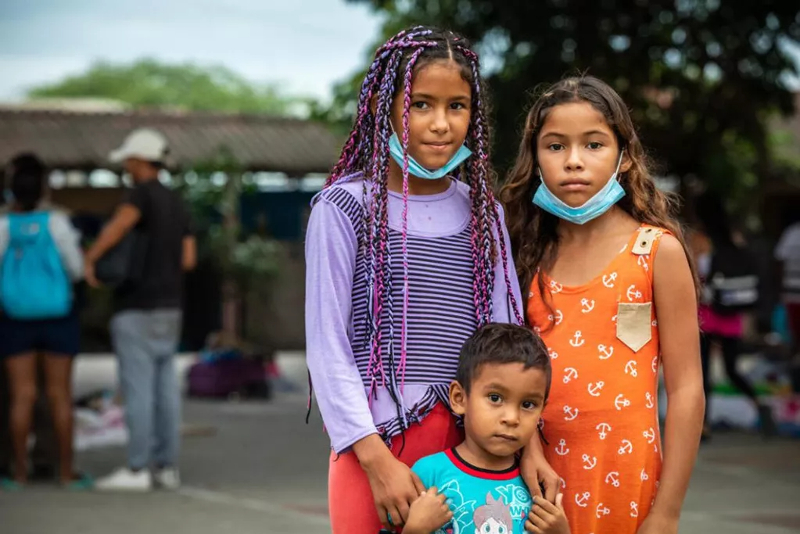
The good news is that in Malaysia, things are not so bad. Malaysians, as Leong points out several times during our interview, are a generous lot and the country has developed quite a bit over the years too. “My view is that we’ve done quite well, although we still have vulnerable groups who need assistance,” she observes. “Sabah is a good example.”
While the poverty rate in Sabah has decreased from 23.9% in 2016 to 19.5% in 2019, it remains the highest in Malaysia. In response to the needs of the communities there, World Vision Malaysia piloted its first Community Development Programme in Tulid in 2014. In 2017, a second CDP was started in Tatalaan. In partnership with the Sabah government and communities, both CDPs address major challenges faced by the children and families concerning access to education, hygiene and sanitation, health and nutrition, child protection and community development.
But rather than assume what is required in these villages and spoon feed it, World Vision’s teams work with community leaders on the ground to ensure that help is delivered where and how it is needed most. Leong says: “We don’t helicopter in and act like saviours, presuming to know what these communities need. Instead, we talk to the leaders on the ground to find out what the children require, what the communities require, and how we can help. This means the housewives and farmers and daily wage workers that come together for this get the chance to make critical decisions for those in their charge. This is what World Vision does best — engaging with the community.
“While we have progressed economically, we haven’t yet lifted our communities adequately, giving them a progressive mindset to succeed. We run many children’s camps in Sabah and our goal is always for a mother to take over and run it herself. Money is important, giving them coaching is important, but uplifting people so they have the confidence to have a go at something independently is the goal here — they need to know they can be responsible for their families, and that is what World Vision is going for.”
Another community-driven programme that has been hugely successful for World Vision Malaysia is One Goal Malaysia, established in October 2014 to tackle child malnutrition by leveraging the power of and the passion for football in the country. Founded on the three pillars of proper nutrition, sports and a healthy lifestyle, OGM is a partnership between the Asian Football Confederation, Football Association of Malaysia and World Vision Malaysia, to advocate for proper nutrition for children. Its flagship programme, Eat Right to Play Right, was launched in 2016 and spanned a period of six years (until 2021). This innovative programme sought to address malnutrition by improving children’s understanding of healthy eating practices through grassroots football.
participants_at_a_pesta_bola_sepak_21.jpg
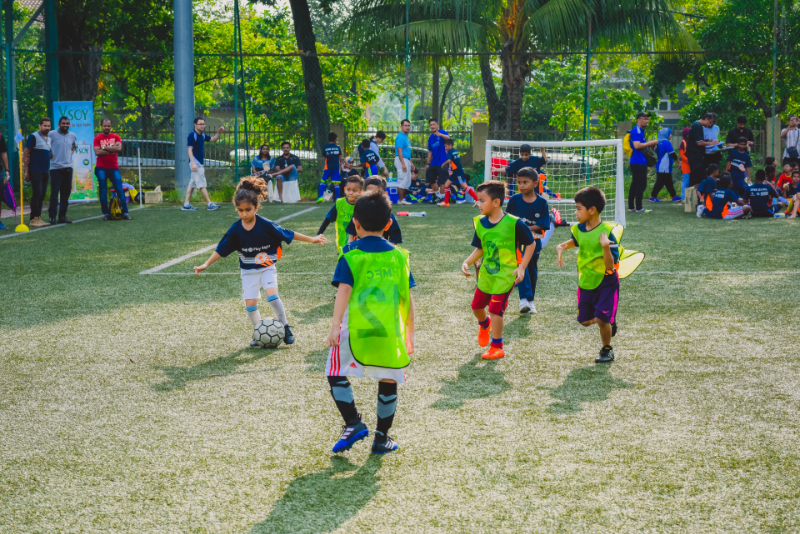
Each programme cycle lasted a year and comprised 30 weekly football-for-nutrition sessions run by trainers who worked with specialists in health and nutrition as well as child protection to ensure quality. The training drills were integrated with health and nutrition messages, where the children learnt about nutrition through football. Parents, guardians and the wider community were encouraged to participate in activities such as Nutrition Workshops and Family Days to increase their nutritional knowledge, inculcating better nutrition practices at home.
The programme is a resounding success, something World Vision Malaysia has been able to track, owing to its meticulous reporting structure. “This is something we pride ourselves on,” Leong says. “Before we even start, we work out the success parameters with our programme donor. For instance, we measured the weight of the children — stunting and overweight issues — and whether the community is eating better, considered over the course of a year. We’ve noticed a 60% increase in knowledge about nutrition. We report back to our donor every six months — and this happens in all our projects. If you have ‘adopted’ a child, you are told how the child is doing and how the community is doing. We are very proud of our reporting, and real sticklers about it too.”
What tomorrow brings
Our conversation soon meanders to the topic of the future — specifically, how World Vision is equipped to handle the pressures of a changing world, and an increasingly demanding millennial generation whose needs and wants are far different from older donors who are happy to send along a cheque once a month. What of them, we ask?
“Recently, we did a survey on millennials and one set of questions we asked was related to social justice — among them, if they have made donations in the last year. In that 1,000 people surveyed, a great many support social justice. I feel that organisations like ours need to be able to identify causes, educate on that cause, and also highlight them in a way that’s interesting to the young. In the last year, during the pandemic, results have shown 60% of young people — despite not having all that much money themselves — have donated to various charities.
“They want to give, but we need to match this, we need to find out the areas young people today are interested in. Climate change is a good example, and child marriage, which continues to be an issue. So, we need to take up these challenges and give young people a way to engage and participate.”
Leong points out how World Vision Malaysia’s 30-Hour Famine event has offered this unusual chance to engage, from the time it was launched 25 years ago. An annual advocacy campaign, it empowers local youth to understand the issues relating to hunger and poverty by getting them to fast for a full 30 hours. “We were so ahead of the curve with this event, which we have done for 25 years — young people coming together, going through this remarkable experience of going hungry … It was really a far-reaching move because that is the sort of activity young people want today,” she marvels.
30-hour_famine_participants_engage_in_activities.jpg
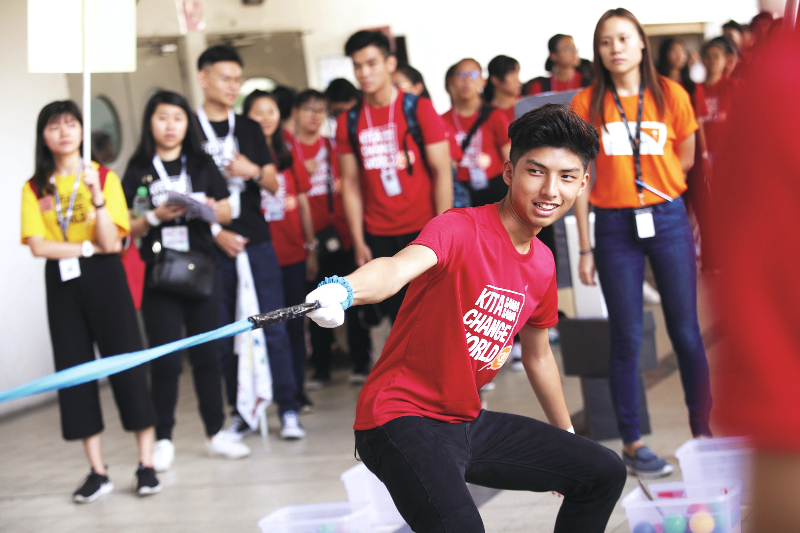
Having attended and fasted with the participants several times over, Leong can personally attest to the efficacy and impact of such an initiative. “They are all there for the same reason, they are in this together — that shared experience is very valuable. During the pandemic, we did at-home events for this but it’s not the same as sitting in a stadium with so many of your peers and going through the same thing.” Held virtually last year, the 2021 30-Hour Famine raised RM464,027 for programmes combatting hunger in Malaysia and around the world. This year, the event will be held in-person again in September.
“The idea of community is also very important for young people and that’s the direction we NGOs need to head towards. They are interested in the whole supply chain, starting with where the money comes from to the communities it enriches. We have been doing this for many years, of course, so this is another way we have been a little ahead of the curve. This is what NGOs need to do to stay relevant — engage with young people, create an impact in communities and go digital, which is incredibly critical,” Leong says.
This goes back to the topic of leadership, and she jokes again about being “acting CEO” until someone new is hired. In all honesty, however, Leong’s openness and ability to communicate the organisation’s values make her an excellent candidate — she is the perfect person for the role. How is she different from her predecessor? “Well, I am much prettier,” she quips. Okay, so we get to add a sense of humour to her list of qualifications.
The laughter dies down and she considers the question carefully before answering. “Our previous CEO was a finance person and, during his time, he really helped World Vision Malaysia get its books in order. We got better at reporting and presenting our numbers, as well as making better decisions based on those numbers. He and I worked very well together but where I might differ is that I’m more hands-on — with the new website, for example, I was very involved, and I’m hoping in the time I’m here, we can establish clear outcomes for digitisation. I really want to get these going so whoever comes after me can take over this aspect and run with it.”
Despite a rough last two years in regards to fundraising, the future is bright, says Leong. “I have full faith in World Vision — we have global experience and input from things happening all over the world, which includes good things and lessons on what doesn’t work. For World Vision Malaysia, it’s been 25 years and I’ve been here for 10 of that. What I find interesting is that we’ve created a value system that’s very strong and very apparent. The team are quite young and, for me, to see them all working towards a common cause says a lot.
“Malaysians are very generous; this never ceases to amaze us. Our board members have stories from 25 years ago about people who would take a bus and come all the way to us to make their monthly contributions, for example.”
We find it hard to believe World Vision Malaysia could be better helmed by anyone else, regardless of Leong’s own ideas for someone younger to take over at some point in the future. She laughs when we say that, redirecting the conversation to the organisation. “We are on the right track,” she says assuredly. “And we will never stop doing what we do.”
This article first appeared on June 20, 2022 in The Edge Malaysia.


